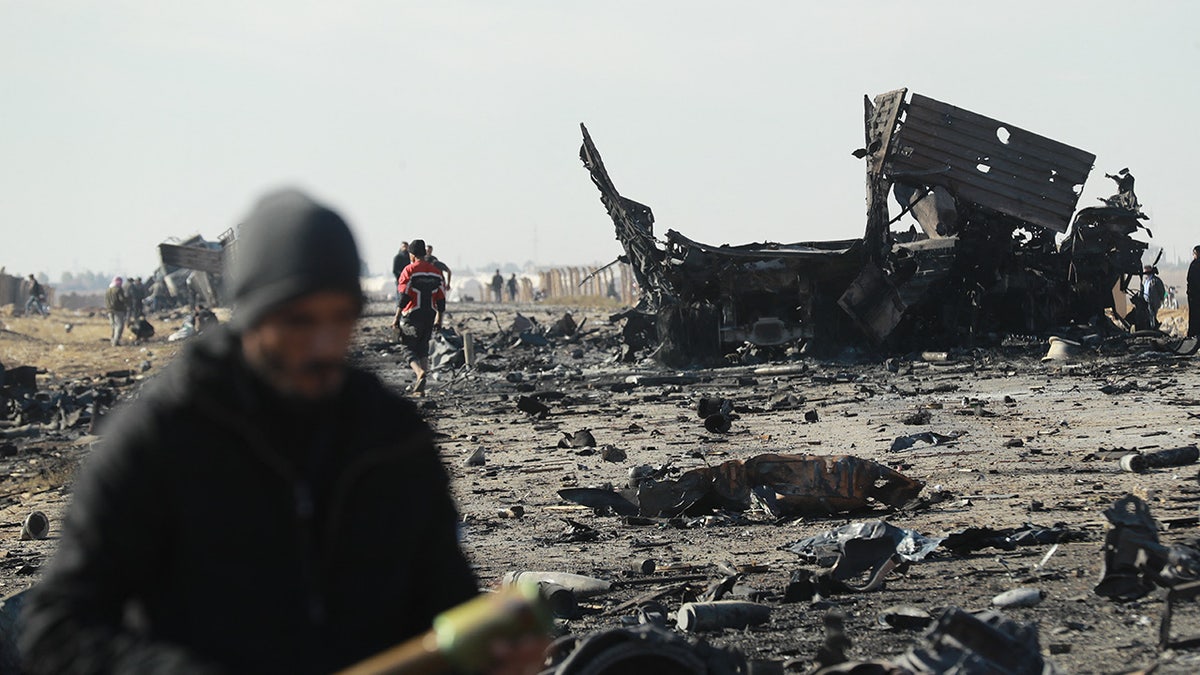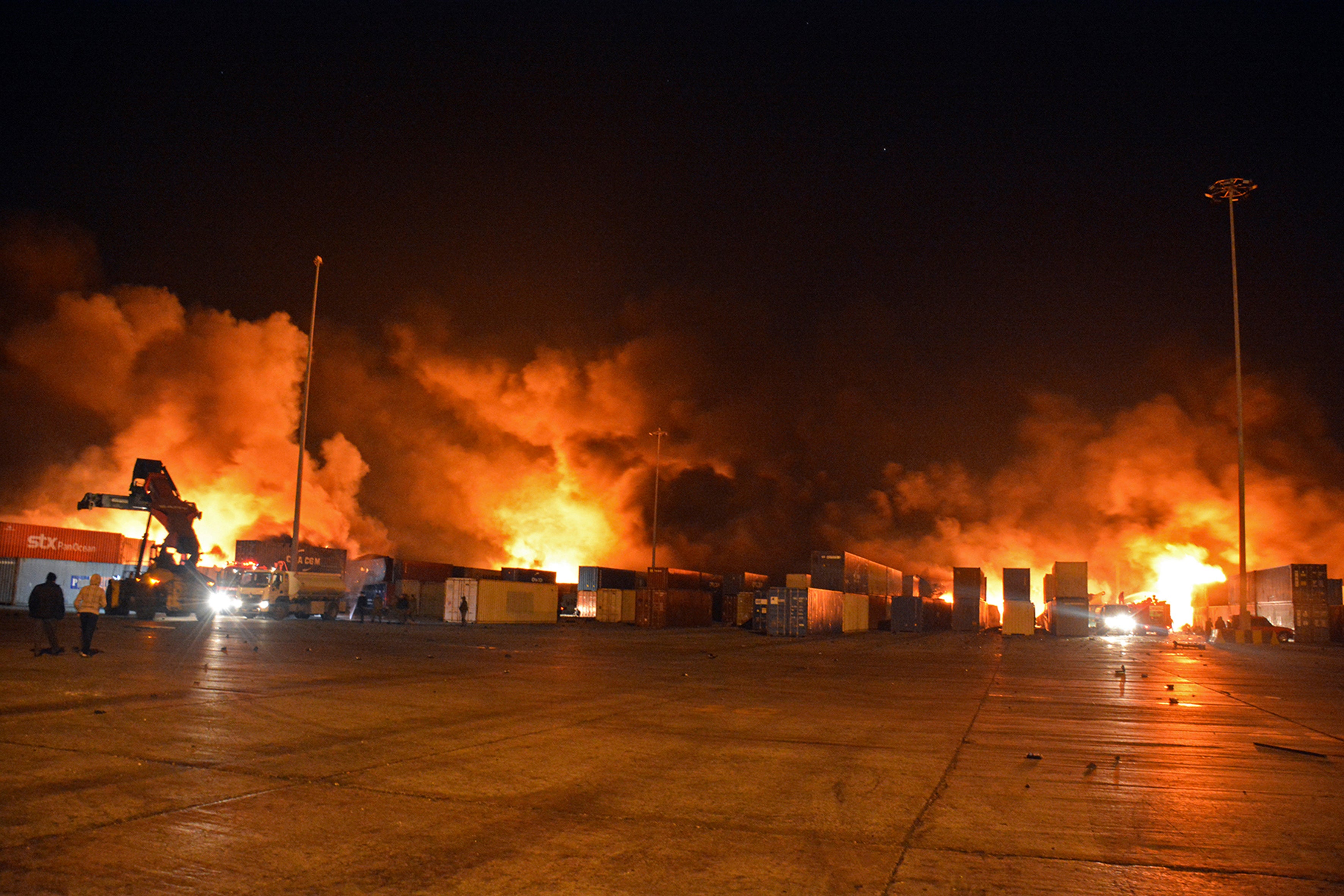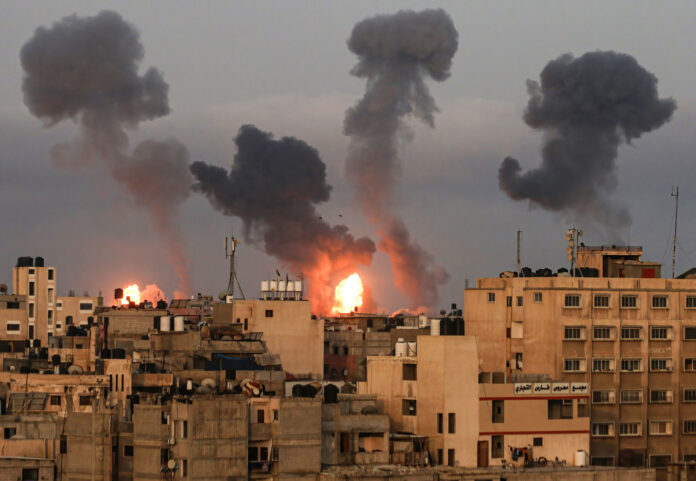On Tuesday, the IDF announced that it had carried out a series of airstrikes targeting military sites in southern Syria. According to an official statement, the strikes hit command centers and multiple weapons storage facilities. The Israeli military warned that “the presence of military forces and assets in the southern part of Syria pose a threat to the citizens of the State of Israel.” This message was as clear as it was aggressive: Israel will act without mercy to remove any military capability that could be used against it.
Two people were reportedly killed in one of the strikes targeting a military unit’s headquarters southwest of Damascus. While it is not entirely clear whether these victims were combatants or civilians, the very fact that lethal force was used underscores the IDF’s readiness to engage in lethal military action when Israel’s security is at stake.
For Netanyahu and his supporters, the strikes are not merely about punishment—they are about survival. “We have no intention to meddle in Syria’s internal affairs,” Netanyahu stated, “but we will do whatever is necessary to ensure our security.” This statement leaves little room for negotiation or compromise. It is a declaration that Israel’s primary focus is the protection of its citizens, even if that means launching preemptive and aggressive military operations in a neighboring country.
The Official Justification: Security Above All
The Israeli government has long maintained that any military presence in southern Syria constitutes a direct threat to Israeli citizens. The justification for the air strikes is rooted in a deep-seated security doctrine that sees the demilitarization of areas adjacent to Israel as a necessary precondition for national safety. In recent days, following Netanyahu’s call for a “completely demilitarized” southern Syria, the IDF has launched these strikes to enforce that vision.
Defense Minister Israel Katz was particularly forceful in his remarks, warning that any attempt by Syrian forces or terrorist organizations to establish themselves in southern Syria would be met with overwhelming force. “We will continue to operate in order to remove any threat to the citizens of the State of Israel,” Katz declared, leaving no doubt that Israel’s military campaign is as relentless as it is resolute.
This strategy is not new for Israel. In the past, Israel has taken similar measures to thwart hostile military build-ups in neighboring countries. Yet, the current operation carries a new level of aggression. The IDF’s statement leaves it clear that the strikes are part of a broader policy to preempt any future attempts by groups like Hayat Tahrir al-Sham (HTS) or the new Syrian army from setting up bases or stockpiling weapons in the region. In a world where danger lurks behind every military installation, Israel’s approach is simple: eliminate the threat before it has a chance to grow.
Context: The Call for Demilitarization
The latest air strikes did not occur in a vacuum. Just days earlier, Israeli Prime Minister Benjamin Netanyahu had made a bold declaration that southern Syria must be completely demilitarized. In his address, Netanyahu stressed that “the presence of military forces and assets in southern Syria pose a threat” to Israel and that Israel would not tolerate any such presence.
Netanyahu’s call for demilitarization is grounded in a long history of conflict and mistrust between Israel and its neighbors. The demilitarized buffer zone along the Syrian border, established by a 1974 ceasefire agreement following the Yom Kippur War, has long been a flashpoint in the region. However, with the collapse of the Assad regime and the ensuing chaos, the buffer zone has become a contested and volatile area. The new Syrian leadership, struggling to consolidate power, has allowed various militias and military forces to operate in southern Syria. For Israel, this is unacceptable.
By demanding a completely demilitarized southern Syria, Netanyahu is not only seeking to safeguard Israeli lives but also to preclude any possibility of weapons—whether modern or archaic—falling into the hands of extremist groups. This is especially critical in light of the region’s history, where the proliferation of arms has often led to unforeseen consequences. Netanyahu’s aggressive rhetoric is, therefore, a stark reminder that Israel’s security is paramount, even if it means taking unilateral action in a neighboring state.
The Mechanics of the Strikes: Precision and Power

The IDF’s air strikes were conducted with extraordinary precision and power. Using advanced fighter jets, the Israeli Air Force (IAF) targeted specific military installations, including command centers and weapons depots. The strikes were coordinated with meticulous attention to detail, ensuring that key military assets in southern Syria were neutralized.
According to official reports, low-flying aircraft were seen over areas near Damascus and Daraa, indicating that the IAF was operating at very close range to its targets. Explosions and the sound of missile impacts were reported by local monitoring groups, corroborating Israel’s claim that the strikes were successful. In one instance, a military unit’s headquarters southwest of Damascus was hit, resulting in at least two fatalities.
The operation was part of a broader effort to dismantle Syria’s military infrastructure, particularly in areas where hostile forces might gain access to advanced weaponry. This is not the first time Israel has used air power to disable Syrian military capabilities. Over the past few years, the IDF has conducted hundreds of air strikes in Syria, especially since the fall of Bashar al-Assad. However, the recent strikes represent an escalation—a clear signal that Israel is willing to use overwhelming force to secure its borders.
For Netanyahu’s government, the message is simple: Israel’s military will not stand idly by while its neighbors build up their armed forces near its territory. The precision of these strikes, combined with the aggressive posture of Israeli leadership, is intended to deter any future attempts by Syrian forces or terrorist groups from positioning themselves close to Israel.
Regional Implications: Tensions and Risks
Israel’s aggressive air strikes in southern Syria have far-reaching implications for the entire Middle East. The region is already fraught with tensions, and any military action in Syria risks igniting further instability. For many Arab states and international observers, Israel’s actions are seen as a dangerous escalation that could lead to wider conflict.
Syrian Reaction:
The Syrian government, led by the new transitional authorities, has vehemently condemned the Israeli strikes. Syrian officials describe the operations as a violation of Syrian sovereignty and an act of aggression that undermines the country’s efforts to rebuild after years of civil war. The National Dialogue Conference in Damascus, which recently concluded, issued a statement condemning Netanyahu’s provocative remarks and calling on the international community to pressure Israel to halt its incursions. In a region where trust is scarce and alliances are fragile, such unilateral military actions risk deepening the divisions between Syria and its neighbors.
Regional Backlash:
Arab nations and international bodies have also criticized Israel’s actions. Many view the air strikes as a blatant disregard for international law and a violation of the 1974 ceasefire agreement that established the demilitarized buffer zone. Countries such as Egypt, Jordan, and Turkey have expressed concern over Israel’s expanding military footprint in Syria, fearing that it may set a dangerous precedent for future interventions. International organizations, including the United Nations, have called for restraint and urged Israel to resolve its security concerns through diplomatic means rather than unilateral military action.
Impact on Terrorism and Extremism:
One of Israel’s key arguments for the air strikes is to prevent advanced weapons from falling into the hands of extremist groups such as al-Qaeda and the Islamic State. In a region where the proliferation of arms has often fueled further violence, Israel’s aggressive campaign is intended to preempt any such developments. However, critics warn that the strikes might have unintended consequences. By destabilizing southern Syria further, Israel may inadvertently create a power vacuum that could be exploited by terrorist groups, leading to an increase in extremist activities that would pose an even greater threat to regional stability.
The Role of Iran:
Iran remains a central player in the conflict. For years, Iran has used Syria as a conduit to supply weapons and support to Hezbollah in Lebanon, posing a continuous threat to Israel. Netanyahu’s aggressive air strikes are part of a broader strategy to thwart Iran’s military ambitions in the region. By targeting military sites that house Iranian weapons and assets, Israel aims to weaken Iran’s influence and prevent the transfer of arms to hostile groups. However, this strategy is fraught with risks. A direct confrontation with Iran, even if mediated through proxy forces in Syria, could escalate into a wider regional war that would draw in multiple state and non-state actors.
Risk of Escalation:
Every strike carries the inherent risk of escalation. Syrian air defenses, although weakened by years of conflict, have the potential to retaliate if they perceive Israeli actions as too aggressive. Moreover, any miscalculation could trigger a broader conflict involving other regional powers. While Israel argues that its actions are purely defensive, the aggressive nature of the strikes and the rhetoric used by its leaders leave little room for diplomatic resolution. The international community must now grapple with the possibility that these operations could lead to unintended military escalation, sparking a chain reaction of conflict that might engulf the entire region.
The Human Cost: Lives on the Line
Beyond the strategic calculations and geopolitical maneuvers, the human cost of these air strikes is profound. Reports indicate that at least two people were killed in a single strike on a military unit’s headquarters. Although the exact identities and affiliations of the casualties remain unclear, the use of lethal force in any military operation invariably results in loss of life.
For the local Syrian population, the air strikes add to the long list of hardships endured over the past decade of conflict. Civilians living in areas near the border with Israel have long suffered from instability, displacement, and the constant threat of violence. With the IDF’s aggressive campaign intensifying, many Syrians fear that the conflict will spill over into their daily lives, exacerbating an already dire humanitarian situation.
International humanitarian organizations have repeatedly warned that any escalation in military operations in Syria could have catastrophic consequences for civilians. Displacement, loss of livelihoods, and the destruction of infrastructure are all likely outcomes of continued air strikes. While Israel maintains that its actions are necessary for national security, the collateral damage—both human and material—remains a grave concern.

A Strong, Aggressive Opinion: Israel’s Dilemma and the Price of Security
In the face of existential threats, nations are forced to make hard choices. Israel’s aggressive air strikes in southern Syria are emblematic of a nation that refuses to take any chances when it comes to its security. There is no room for compromise when the safety of millions of citizens is at stake. Netanyahu’s government has made it unequivocally clear: any military build-up or presence in southern Syria that could potentially be used to launch an attack on Israel will be met with a swift and brutal response.
This aggressive stance, while harsh, is driven by a stark reality. Israel exists in a region where threats are real and ever-present. The collapse of Syria’s government has created a power vacuum that various hostile forces are eager to exploit. In such an environment, any hesitation or compromise could prove fatal. Israel’s military actions are not driven by a desire for conquest or aggression; they are born out of the imperative to protect lives and ensure the survival of the state.
Critics may label Israel’s actions as provocations or as violations of international law, but let us not be naive. In a world where words are cheap and threats are real, the only language that matters is one of decisive action. Israel has long been forced to operate on the frontlines of a dangerous neighborhood. For decades, its enemies have attempted to surround it with hostile forces, to arm terrorist organizations, and to use the instability of neighboring states as a pretext for launching attacks.
Netanyahu’s call for a completely demilitarized southern Syria is not a mere slogan—it is a necessary policy in a world where the only guarantee of safety is strength. The IDF’s relentless air strikes serve as both a deterrent and a preemptive measure, ensuring that Syria does not become a launchpad for weapons that could threaten Israeli citizens. While such measures may seem extreme, they are a reflection of a harsh reality: peace in the Middle East has always been elusive, and only those who are willing to fight for it can hope to achieve it.
Yet, there is a danger in this aggressive posture. Over time, relentless military strikes and uncompromising rhetoric risk isolating Israel further, pushing its adversaries to unite against a common foe. History is littered with examples of nations that, in their quest for security, have inadvertently sown the seeds of future conflict. If Israel is not careful, its actions in southern Syria could spark a broader conflagration that might engulf the entire region.
The international community must understand that Israel’s aggressive measures are not taken lightly. Every strike, every missile launched, is weighed against the potential threat posed by hostile military build-ups along its borders. While diplomatic solutions are always preferable, when faced with an immediate threat, decisive military action is the only option. Netanyahu’s government is sending a clear message to Syria, Iran, and any other state or group that dares to challenge its security: Israel will not back down, and it will not tolerate any threat to its citizens.
In the end, the aggressive air strikes in southern Syria are a reflection of a broader truth about the nature of modern conflict. In today’s volatile world, security is not achieved through negotiation alone—it is won on the battlefield, with resolve, precision, and an unwavering commitment to protecting one’s people. Israel’s actions may be controversial, and they may be criticized by those who prefer diplomacy over force. But when the stakes are as high as they are, there is no alternative. The price of security is high, and sometimes that price must be paid in blood.
Conclusion: A Call to Arms or a Precarious Path Forward?
Israel’s aggressive air strikes in southern Syria are a bold statement—a declaration that the safety and security of Israeli citizens will be defended at any cost. The IDF’s recent operations, conducted with precision and an uncompromising resolve, send a clear message to all potential adversaries: Israel will not allow its borders to be compromised.
While the international community debates the legality and long-term consequences of such actions, the reality on the ground is stark. The collapse of Syria’s government has opened the door for hostile forces to amass weapons and military capabilities that could one day be used against Israel. In this context, Netanyahu’s call for a demilitarized southern Syria is not only justified—it is essential.
The price of security is steep, and in a region as unpredictable as the Middle East, there are no easy answers. Israel’s aggressive stance, while potentially isolating it further on the international stage, is driven by an inescapable imperative: the survival of the state. As long as threats loom large on its borders, Israel will continue to take bold, decisive action—action that is as ruthless as it is necessary.
In the end, the real question is not whether Israel should act aggressively, but whether the world is prepared to accept that sometimes, in order to protect its people, a nation must choose the path of strength over diplomacy. For Israel, that choice has been made, and the consequences—both hopeful and perilous—will shape the future of the region for years to come.

